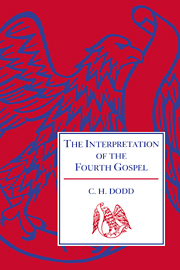Book contents
- Frontmatter
- Contents
- PART I THE BACKGROUND
- 1 The setting in early Christianity
- 2 The higher religion of Hellenism: the Hermetic literature
- 3 Hellenistic Judaism: Philo of Alexandria
- 4 Rabbinic Judaism
- 5 Gnosticism
- 6 Mandaism
- PART II LEADING IDEAS
- PART III ARGUMENT AND STRUCTURE
- APPENDIX: Some considerations upon the historical aspect of the Fourth Gospel
- Index Locorum
- Index Nominum
1 - The setting in early Christianity
from PART I - THE BACKGROUND
Published online by Cambridge University Press: 10 December 2009
- Frontmatter
- Contents
- PART I THE BACKGROUND
- 1 The setting in early Christianity
- 2 The higher religion of Hellenism: the Hermetic literature
- 3 Hellenistic Judaism: Philo of Alexandria
- 4 Rabbinic Judaism
- 5 Gnosticism
- 6 Mandaism
- PART II LEADING IDEAS
- PART III ARGUMENT AND STRUCTURE
- APPENDIX: Some considerations upon the historical aspect of the Fourth Gospel
- Index Locorum
- Index Nominum
Summary
There is a scene in the early part of Goethe's Faust, where the hero, yearning for the light of revelation (which nowhere burns more brighly than in the New Testament), sets himself to translate the Gospel according to John. At the very first clause however he finds himself in a difficulty. How is it to be rendered? ‘In the beginning was the Word.’ But how can so high a value be set upon the mere word? Surely, ‘In the beginning was the Thought’. But again, is it truly thought by which all things were made? Is it not rather Power? Or should he boldly render the sense of the passage, ‘In the beginning was the Deed’?
The difficulty which baffled Faust at the beginning of his task is one which besets the student of the Fourth Gospel all through. He finds it impossible to satisfy himself regarding the meaning of the text without raising prior questions involving the whole universe of discourse within which the thought of the gospel moves. It is in general a sound maxim that any interpretation of the thought of a work as a whole should be based on a precise exegesis of the text. Through disregard of this maxim many elaborate interpretations of biblical and other documents have gone astray. It is true that exegesis always demands some kind of assumption regarding the general aim and the background of the work in hand; but in many cases this demand is fairly easily met, the required assumptions being such as are more or less obvious to the intelligent reader. But with such a work as the Fourth Gospel it is different.
- Type
- Chapter
- Information
- The Interpretation of the Fourth Gospel , pp. 3 - 9Publisher: Cambridge University PressPrint publication year: 1953



